The Biggest Arts Education Phenomenon in the World—But Not in Theatre, Yet
I am a theatre person who found my way into decades of work in the orchestral world. My passion for “teaching artistry” led me to help develop the emerging field in the late ’70s and 80s. I developed the teaching artist program at Juilliard, which led to a long parade of projects including: consulting with seven of the ten largest orchestras in the US; and work with many conservatories, school music programs, cities, and states on arts education policies. My artistic soul, however, still belongs to theatre, and the classical music world still seems like a strange foreign culture to me.
In 2007, I traveled to Venezuela to check out “El Sistema,” an intensive youth orchestra program for young people in barrios that began in 1975. The program currently involves 800,000 young people—more youth than organized sports in a sports-crazed country. The twenty hours of rehearsal per week for most students produces remarkable musical accomplishments, and hundreds of excellent youth orchestras. Yet, the goal of El Sistema is to transform the lives of young musicians, to disrupt entrenched cycles of poverty, by developing their confidence and learning along with their talent. Based on all the glowing reports I had heard, I expected El Sistema to be interesting but overhyped. Instead, I found the most extraordinary accomplishment in arts learning and in youth development I have ever seen.
Unfortunately, there is no Sistema-inspired program in theatre. I can see no reason why the principles that work in music wouldn’t work in theatre, as long as the same values are rigorously explored.
Global Expansion
El Sistema’s idea of youth development through intensive ensemble art-making has spread. It has spread across Latin America during the last three decades, and in the last ten years it has spread to sixty-five countries around the world. I think it is historically unprecedented for an idea from the arts to be embraced around the world as a solution to social problems that resist every other kind of intervention. It is also the first idea from Latin America embraced worldwide as an answer to intractable cultural challenges. The term “El Sistema” makes it sound formulaic, but it isn’t. It isn’t a franchise, a set program, or even a pedagogy; it is an inquiry into how a core set of principles can be adapted, rediscovered, and realized in local communities and local culture.
In researching our book Playing for Their Lives: The Global El Sistema Movement for Social Change Through Music, my co-author Tricia Tunstall and I traveled to twenty-five countries, and 100 program sites to observe El Sistema-inspired programs. There are now almost one million young people investing their free time to make art, and then better art with their friends. There are programs in Afghanistan, Palestine, and refugee camps in Europe; in slums of Manila, Rio and Nairobi; in a Maori community of New Zealand, and an Inuit community of Greenland. Wealthy cities like Los Angeles, New York, Paris, London, Stockholm, Vienna, and Hong Kong even have programs for children living in poverty. There are over 130 different programs in the US alone. Though the research is still scarce, it affirms the enthusiastic claims—intensive ensemble learning in the arts can, and does change the trajectory of kids’ lives.
Setting the Stage
Unfortunately, there is no Sistema-inspired program in theatre. I can see no reason why the principles that work in music wouldn’t work in theatre, as long as the same values are rigorously explored. José Antonio Abreu, the founder of El Sistema, has said for years that all art forms should form El Sistema programs. There is one school-based program in Los Angeles that has parallel programs in music and dance, and they see similar positive results in the dance group as they do in the orchestra. So why not theatre?
Here are some of the key principles that make El Sistema-inspired work in music so powerful for young people in tough circumstances around the world, and some thoughts about what they would mean for a theatre program.
Ensemble
A Sistema orchestra is an interdependent community of equals that functions as an almost ideal society. Individuals are not singled out, and the instruction is within the group, not one-on-one in private lessons (which do happen when finances allow because they accelerate learning). In theatre, this would mean we’d have to do predominantly ensemble work, instead of works with a few major roles and many minor ones. I think devised work would be especially powerful as the backbone of a Sistema theatre program. Readers, you know how powerful youth ensemble theatre work is—why not harness that into a sustaining, multi-year Sistema program and multiply the impact we get in single projects?
Access and Excellence
These ideas are usually positioned as contradictory in music in the US—if you allow everyone in, without auditions, you can’t achieve artistic greatness because you have many players who aren’t very talented. El Sistema successfully challenges this assumption with no-cost entry to every young person who wants to make the commitment. And because of the learning environments of high aspiration, full responsibility of peer-mentoring, and gritty determination to become great, the orchestras achieve at implausibly high levels. In theatre, we don’t have the handy universal measurements of ability that music does, which might actually make open access easier, even as it makes it harder for learners to objectively evaluate the accruing success of their abilities and of the ensemble’s.
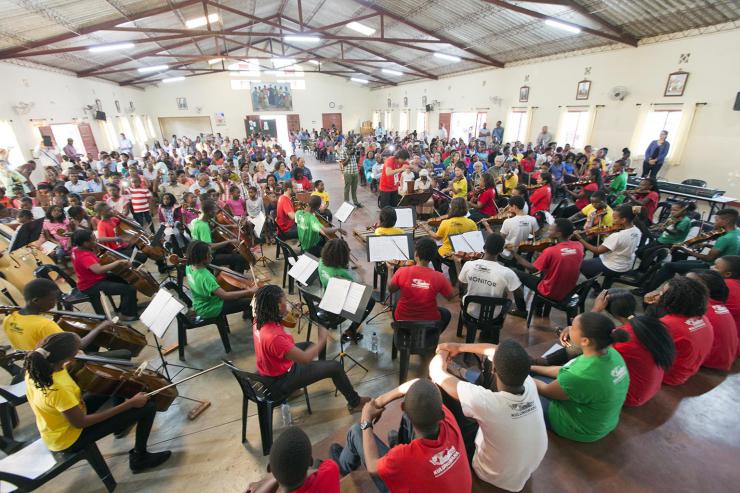
The vicious cycle of poverty can be broken when a child poor in material possessions acquires spiritual wealth through music. —José Antonio Abreu
Intensity
Sistema programs are mostly after school, and average about 12 hours a week in the US (In Latin American countries, they’re more likely to be 20 hours a week.) When a program has hit full stride, the young people usually want more hours of rehearsal, and practice more at home and wish to rehearse on weekends and holidays. The rehearsal hours are highly focused and fast-paced. Visitors are always impressed by the level of concentration and “discipline” they see in young Sistema students—this is achieved through intrinsic motivation, the students’ determination to improve and excel, rather than through control by the teachers. Intensity is increased by frequent performances and demanding repertoire that interests and challenges the young musicians. I don’t see why this would be any different in a theatre program—if young actors are intrinsically-motivated to make the work great, they apply themselves with at least as much fervor as music students do.
Learning Environment
Sistema programs create a distinctive learning environment that takes time to cultivate. It is relentlessly positive and inclusive, safe and welcoming, while fun, ambitious and determined. The natural feel of an optimum theatre rehearsal atmosphere is close to the Sistema ideal. I often say that El Sistema is in the intrinsic motivation business, and theatre can create the conditions and relations that foster this as well as any other human endeavor.
Peer Instruction
Originally, in El Sistema Venezuela, peers taught peers because there weren’t enough teachers. However, the practice proved to have extraordinary benefits, such as creating healthily interdependent groups of young people. In Venezuela, the informal adage has it: “If you know how to play four notes, it is your responsibility to teach your friend who only knows three. And in teaching her the fourth, you become more ready to learn your fifth.” This would be challenging to nurture in theatre, where skills are not so evident and objectively clear—there is no agreement on the third and fourth notes. Indeed, I think a theatre Sistema program would require its leadership to develop clear understandings of capacities that learners can see and seek to develop, not only to enable students to mentor one another effectively, but also to empower them with clear self-assessment of improvement toward mastery. Subjective judgments of quality could easily impede students’ strong motivation and keep the power in the hands of the adults; the socially transformative aspects of Sistema work, however, come from the learners knowing and owning their strength.
There are other “fundamentals of El Sistema” that you can read about here, which include a distinctive set of roles for teachers, and active relationships with families and local communities. There are many program and funding types you can read about in Playing for Their Lives. Though there isn’t a single damn Sistema program in theatre yet, Wiley Hausam, a long-time producer, artists' manager, and consultant in New York is laying groundwork to launch the first musical theatre Sistema-inspired program in the world.
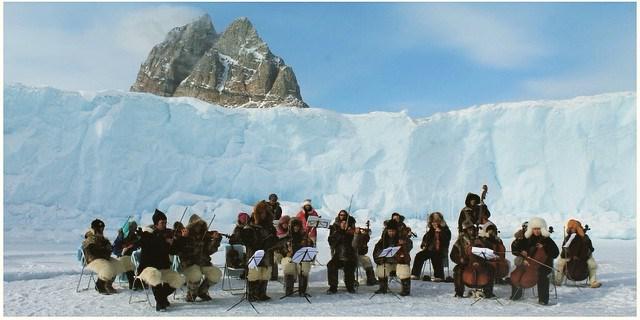
Tapping Our Existing Assets
Let’s affirm that strong Sistema-like programs in theatre do exist and have been around for years. I revere like-spirited programs such as Epic Theatre Ensemble (in New York, NY), Albany Park Theater Project (in Chicago, IL), and 24th Street Theatre’s Leadership Academy (in Los Angeles, CA). I hope that any new Sistema theatre programs study great existing programs, coordinate with them, and make sure they do them no harm. This shouldn’t be too hard because there is, unfortunately, abundant need. New Sistema programs invariably tap new funding, so they won’t deplete the sustaining funding that existing programs require. It has been hard for many Sistema music programs in the US to make win-win connections with similar existing youth orchestra programs, even with good music programs in schools. It is circumstances that tend to stand in their way—mostly founders are just too busy to foster connections. Knowing that challenge, Sistema theatre programs could start off with such alliances in mind.
José Antonio Abreu once said, “Poverty is not just a lack of a roof or bread. It is also a spiritual lack—a loneliness and lack of recognition. The vicious cycle of poverty can be broken when a child poor in material possessions acquires spiritual wealth through music.” I think the same can be said of theatre too.

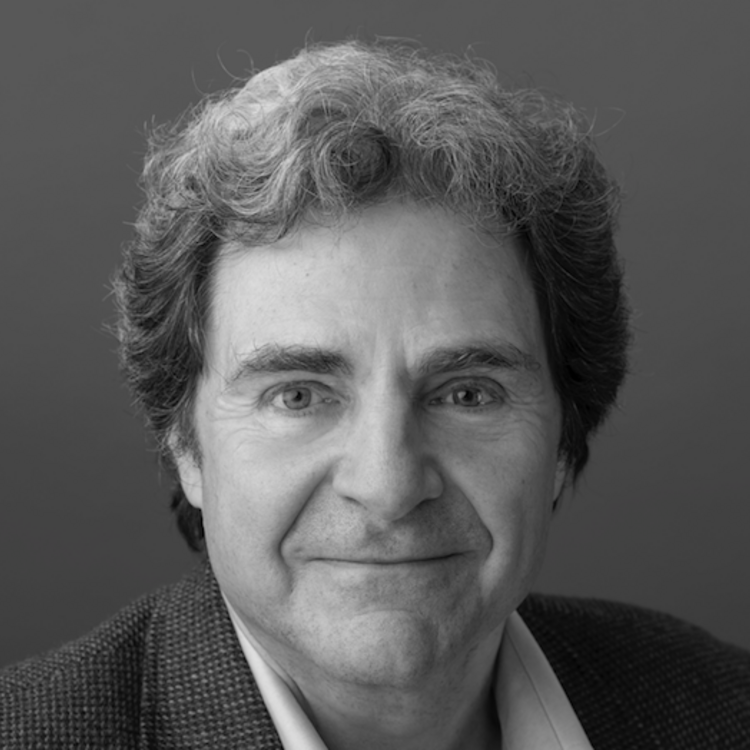
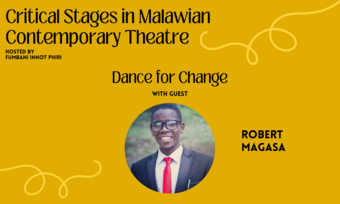


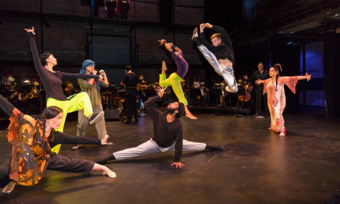


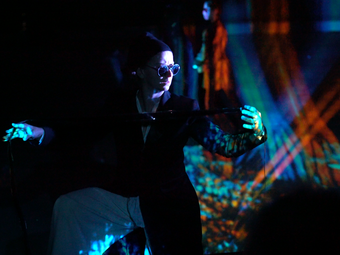

Comments
The article is just the start of the conversation—we want to know what you think about this subject, too! HowlRound is a space for knowledge-sharing, and we welcome spirited, thoughtful, and on-topic dialogue. Find our full comments policy here
Terrific article and an idea something that we at the Minnesota Opera have been working on. We started Music Out Loud a few years ago as an opera-based El Sistema-inspired program that works with kids using the elements of opera (music, theater, movement, design). It's an exciting idea with great potential!
Excellent article! I am in my 8th year of teaching a seattle-based program called Theater of Possibility for youth with autism spectrum and other developmental differences. I also teach the same program (at a different venue) to previously homeless youth in subsidized housing. We use devised theater and principles of Augusto Boal's Theater of the Oppressed to create original material from the students' interests and imaginations. I have seen a lot of growth in the youth I work with and the eldest now serve as my teaching assistants with the younger. As a playwright, I find it a joy to create theater working collaboratively with a creative ensemble. Having to write fun parts, with clear character objectives, for every child has taught me to make every character count and made me a better writer. (It's often more fulfilling than what I get in the 29 hour workshop mills of professional theater.) Every playwright should have this opportunity! This is how all theater should ideally be made!
it is invigorating to read these comments. I hope this ongoing consideration of an El Sistema-like theater initiative can engage others. The impact through music has been the single most astonishing thing i have ever witnessed in our field. I know in my bones it can work in theater. Follow the growth of Free Youth Musicals in NYC as it launches this summer.
Especially in the southern U.S., young people without sports abilities never hear applause.
Having encouraged and taught performance and writing for theater to kids who have never heard the sound of stranger's hands clapping I am convinced the sound of applause is life changing. I've seen it happen too many times to believe otherwise.
Excellent article.
Bravo, my friend. I would love to see a forum of some sort that could discuss and debate this idea, as I believe that the drama/theatre education field has advanced quite amazingly in the recent past, but at the same time, the field is pretty good at push back: different programs emphasize different components or concepts related to theatre and drama and are careful about adopting what others do. I don't mean to disparage anyone, I think there is so much good work happening, but it would be lovely to see if common ground could be found within the cast array of work already happening, as opposed to simply selecting a single, pre-existent program.
Great provocation, Eric. Back in the 1990s Shirley Brice Heath, a linguistic anthropologist and MacArthur fellow, did a huge research project on non-school programs for low-income youth and found that arts programs had more significant positive impacts than other kinds of excellent programs. She also found that theater had particularly powerful effects. Why? Principally because theater calls upon a wider range of skills and dispositions than the visual arts or music--both of which are implicated in making theater. Good to see Eric's recognition of Albany Park Theater project as an exemplary American program that is grounded in the Sistema principles. To which it adds another of enormous importance: The young members of the the APTP ensemble make theater about stories they collect themselves from their families and friends in the Albany Park community. Part of their work as theater-makers is writing new work for performance, grounded in the recognition that the stories of people in Albany Park--most of whom are low-income and recent immigrants--have value, meaning and dramatic power. They deserve to be represented in American culture. Orchestral music can't quite duplicate that democratic value.
We have a series called Let's Play! that has free workshops monthly. They are led by a rotation of theater artists that join a volunteer company for a year for that purpose. The company ranges in ages and experience levels, which makes for an array of topics. It's still being developed but its similar in that it is a shared learning model.
I think so too. ("The vicious cycle of poverty can be broken when a child poor in material possessions acquires spiritual wealth through music... or theatre.") Excellent, and inspirational, article!
Well, if you ever take this thought excercise to some kind of preliminary model, look us up, we'd be keen to find a place for such a promising pilot in India
Jehan, do you think a program of this sort could work with any form of traditional Indian drama?
Now I understand why my local classical music station plays so much fine music generated in Venezuela! Thank you so much for this article.
I have also always believed that a similar programs such as El Sistema could work with youth theatre. Please take a look at a program in New London CT that successfully applies the same techniques - it is called Writer's Block Inc. I believe it stands as a good model for the kind of program you are describing, especially devising theatre.